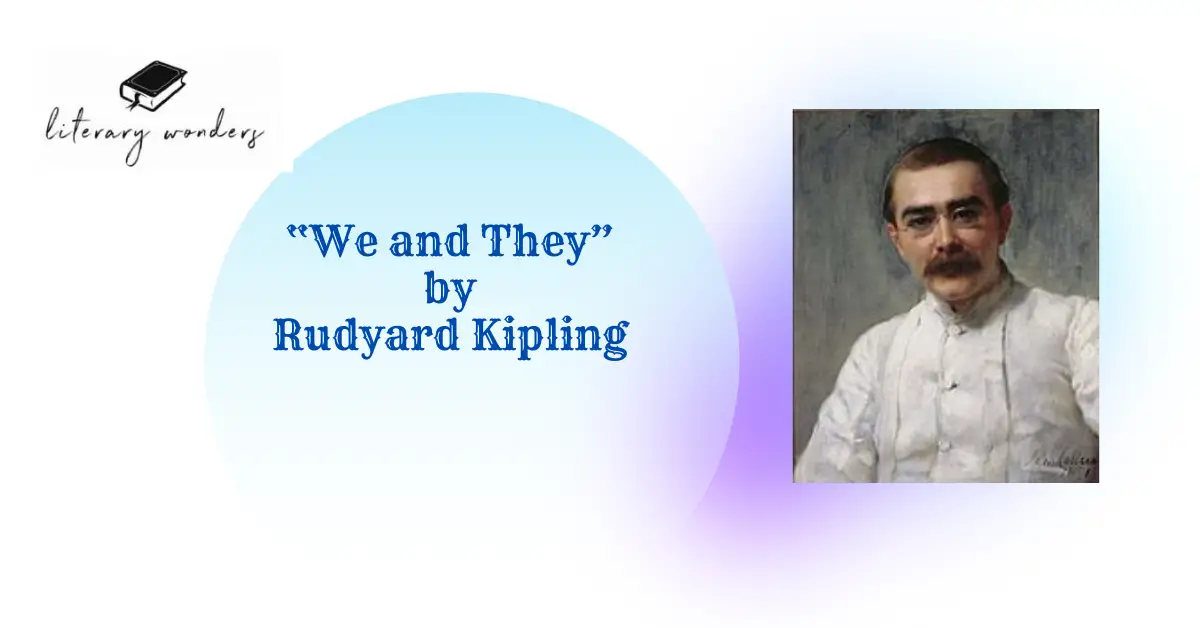“We and They” by Rudyard Kipling Analysis
Summary of the Poem “We and They”
- Introduction of “We and They”: “We and They” is a descriptive poetic piece by Rudyard Kipling, a great English poet and writer. The poem discusses the distinctions between the colonized and colonizer communities. While using the pronouns “we” and “they” in the poem, the speaker masterfully portrays the two opposing cultures. Although the poem’s subject matter appears straightforward, it is engaging to read because of the writer’s philosophical stance on two different civilizations.
- Analysis of “We and They”: The poem “We and They” compares and contrasts two distinct identities, cultures, and lifestyles. The speaker starts this poem by asking a straightforward question that contrasts his identity with that of those who reside across the sea. He was surprised why, despite their differences, they did not count him as superior. By discussing each group’s eating habits and preferences, he creates a boundary and portrays them as inferiors. As the poem continues, the speaker emphasizes the lifestyles of the others even more. He explains how peculiar and unique their hunting is; they prefer using sticks and spears to hunt. He also makes fun of how they dress and their treatment of others. However, the people belonging to the speaker’s community can choose a contemporary and unique way of living. The speaker gives compelling arguments before sarcastically claiming that all good people are members of his group and insinuating that the other group is made up of nasty and savage people. But despite these distinctions, the speaker contends that we should appreciate them.
- Themes of “We and They”: There are several themes layered in the poem such as, surprise, contrastive cultures, and superiority versus inferiority. The speaker draws attention to two unique individuals throughout the poem, highlighting their distinct lifestyles and living standards. He questions how different civilizations coexist on a worldwide scale and how everyone appears content with their lot in life. He claims that he comes from a wealthy family and is accustomed to the tools, technology, and lifestyle of the modern world. But despite without having these resources, the other group lives a flawless existence. The speaker makes the point that, despite our stark differences, we should appreciate the traditions and peoples of other people through this short poetry.
To read the full poem, please click here.
Analysis of Poetic Elements in “We and They”
Literary and poetic elements refer to the tools that the writers use in their writings to make their writings more appealing and deeper. Rudyard Kipling has also inserted some poetic elements in the poem to present his stance on the existence of different civilizations. The analysis of the poetic elements used in the poem is as follows.
- Assonance: The first tool is assonance and it refers to the repetition of vowel sounds. Kipling has repeated the sound of /e/ in “And They live over the sea” and the sound of /o/ in “As only a sort of They.”
- Anaphora: This literary device refers to the repetition of same words or expressions in the first part of some verses. Kipling has used this device in the final stanza of the poem where he repeats worlds like “all” and “and” to emphasize certain points.
- Alliteration: The third literary device is alliteration. It refers to the repetition of consonant sounds in the same line such as the sound of /f/ in “friends for tea.”
- Consonance: Consonance is another tool, which refers to the repetition of consonant sounds in the same line such as /t/ in “They like Their friends for tea” and the sound of /n/ in “With cow-horn-handled knives.”
- Diction: The poem implies descriptive, captivating and symbolic diction.
- Enjambment: Enjambment refers to the continuation of an idea that does not come to an end at a line break; rather, it continues to the next line. For example;
“Sister and Auntie say
All the people like us are We,
And everyone else is They.”
- Free Verse: Free verse means that the poem is not bound to certain patterns of any rhyme scheme or metrical patterns.
- Irony: Irony is a figure of speech in which words are used in such a way that their intended meaning is different from the actual meaning of the words. This device makes the core of the poem. By using irony, Kipling states differences between two cultures.
- Imagery: Imagery is used to captivate the minds of the readers. Rudyard Kipling has used imagery in this poem such as; “But if you cross over the sea”, “And, after all that, they look upon We” and “They stick lions with spears.”
- Rhetorical Question: Rhetorical questions are asked not to find the answers. These questions are deliberately put by writers to make their points clear such as, “But-would you believe it??”
- Symbolism: Symbolism is used to associate the plain ideas to more deep and thoughtful approach. The title of the poem is symbolic as it hints that the text is going to provide a stark comparison about people.
- Stanza: A stanza refers to poetic line written in a short, compact form. The poem presents five stanzas of eight lines.
The analysis shows that these tools have aided the writer to present his thoughts about contrastive cultures in ore appealing way. The insertion of these poetic tools has enhanced the intended impact of the poem.
Suggested Readings

